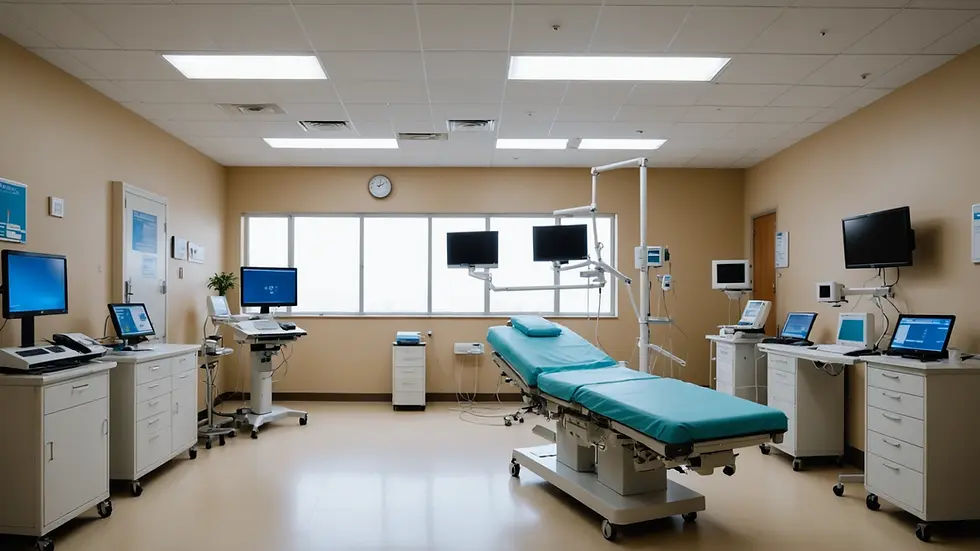Understanding the Essential Role of Data Backup and Recovery in Healthcare
- Reese Robertson
- Dec 27, 2024
- 4 min read
In today’s world, healthcare providers rely heavily on technology for managing patient information and improving operational efficiency. The rising integration of digital solutions is beneficial, but it also makes safeguarding patient data more critical than ever. Data loss can lead to significant disruptions, putting patient care and the reputation of healthcare facilities at risk. This blog discusses the vital role of data backup and recovery in the healthcare sector, highlighting the importance of protecting patient information and ensuring seamless service.

The Digital Transformation in Healthcare
The transition to electronic health records (EHR) and various digital tools has revolutionized healthcare services. For instance, studies show that healthcare facilities using EHR can reduce the time doctors spend on paperwork by up to 70 percent. However, with more reliance on digital systems comes the risk of data breaches and cyber attacks. In fact, nearly 60% of healthcare organizations have reported experiencing a cyber incident recently, revealing the pressing need for effective data backup solutions.
The Cost of Data Loss
Data loss has serious ramifications in the healthcare sector. Consequences include breaches of patient confidentiality and interruptions in medical services. For example, a data breach can lead to:
Diminished Patient Care: When healthcare professionals cannot access vital patient information, it can delay treatment and compromise care quality.
Fines and Loss of Accreditation: According to the Ponemon Institute, the average cost of a data breach in healthcare is around $4.35 million, with penalties for non-compliance adding significantly to this total.
Loss of Trust: Studies reveal that 47% of patients would switch providers if they experienced a data breach, highlighting the potential reputational damage.
High Recovery Costs: Organizations often spend significant resources to recover from data loss incidents, further straining budgets and resources.
Operational Disruption: Data loss can cause a ripple effect, creating backlogs and overwhelming healthcare staff during recovery efforts.
Given these consequences, investing in robust data backup systems is not just smart; it's essential for healthcare providers.
Implementing Effective Data Backup Strategies
Healthcare organizations need to adopt a set of best practices to protect their data effectively. Here are some key strategies:
Regular Backups: Automating backups daily or weekly ensures patient data is consistently protected. Research shows organizations that have automated their backup processes experience reduced recovery time by 30-50%.
Redundant Systems: Using various storage solutions such as local servers, cloud backups, and external drives ensures that if one method fails, others can recover the data quickly.
Data Encryption: Encrypting sensitive patient data safeguards it against unauthorized access. A report by IBM found that proper encryption could reduce costs associated with a data breach by 24%.
Testing Backup Systems: Regular testing helps confirm that data can be restored reliably when needed, ensuring readiness in the event of a data loss incident.
Employee Training: Training staff on security protocols and proper data handling can minimize human errors, which account for a significant portion of data loss incidents.
The Role of Recovery in Minimizing Downtime
While backing up data is essential, the ability to recover quickly is equally important. An effective recovery plan can significantly limit downtime after a data loss event. Key elements of a strong recovery strategy include:
Comprehensive Disaster Recovery Plans: These plans should outline detailed procedures for restoring data and services promptly.
Quick Response Times: Research indicates that a prompt recovery response can decrease the negative impact on patient care and keep operations running smoothly.
Patient Communication: Transparent communication during recovery efforts helps maintain patient trust and clarifies the situation.
Collaboration with IT Specialists: Working with recovery experts can enhance the process, ensuring a seamless return to normal operations.
Meeting Regulatory Compliance
Healthcare providers must comply with regulations like the Health Insurance Portability and Accountability Act (HIPAA). These standards require implementing adequate safeguards for patient data, including backup and recovery measures. Non-compliance can trigger significant penalties and financial strain.
By prioritizing data backup solutions, organizations safeguard patient data and meet regulatory requirements. Regular evaluations of data handling processes also ensure ongoing compliance and protect the organization's integrity.
The Evolution of Data Technologies and Their Impact
As technology advances, so do the strategies for securing healthcare data. Noteworthy developments like blockchain and artificial intelligence (AI) offer promising enhancements for data backup and recovery processes.
Blockchain: This technology allows for decentralized storage of patient data, reducing vulnerabilities associated with single-point failures. Reports suggest that blockchain could cut the costs of data management by 30% while enhancing security.
AI Solutions: AI can identify potential vulnerabilities and predict data loss incidents. For instance, AI-powered solutions can analyze historical data patterns and alert healthcare organizations about possible risks before they escalate.
The Importance of Partnering with Experts
Choosing a reliable vendor for healthcare data backup solutions is key. Specialized partners can provide tailored services that suit the unique needs of healthcare providers. Such partnerships often yield:
Expertise: Access to the latest technologies and best practices for data security and recovery.
Scalability: Solutions that evolve alongside the organization, adapting to growing data volumes and changing requirements.
24/7 Support: Ongoing vendor support ensures smooth backup and recovery processes.
Patient Data as a Top Priority
At the core of healthcare is patient trust. Ensuring patient data is regularly backed up and easily recoverable not only reduces risks but also fosters an environment where patients feel safe regarding their information.
Healthcare providers emphasizing data security can reassure patients of their commitment to confidentiality and quality. This proactive approach enhances patient experience and strengthens the facility's reputation in a competitive market.
The Bottom Line
In a digital age where technology drives healthcare, the importance of data backup and recovery cannot be overstated. As the landscape grows more complex, protecting patient data is vital for reliable and compliant operations.
Investing in strong data backup solutions is not merely a choice but a promise to deliver quality care and security. By implementing comprehensive strategies for backup and recovery, healthcare organizations can defend against threats, limit disruption, and ultimately build trust with patients.
Facilities that prioritize these practices will not only mitigate risks but also become leaders in an ever-evolving industry prepared to face future challenges.



Comments